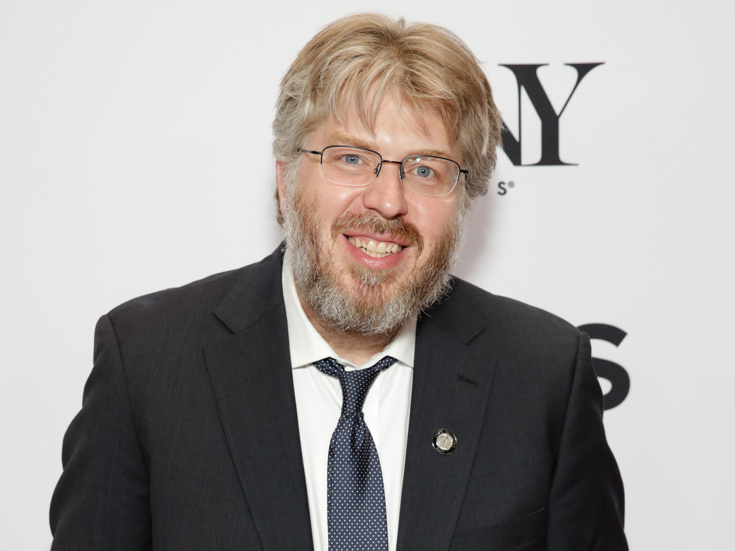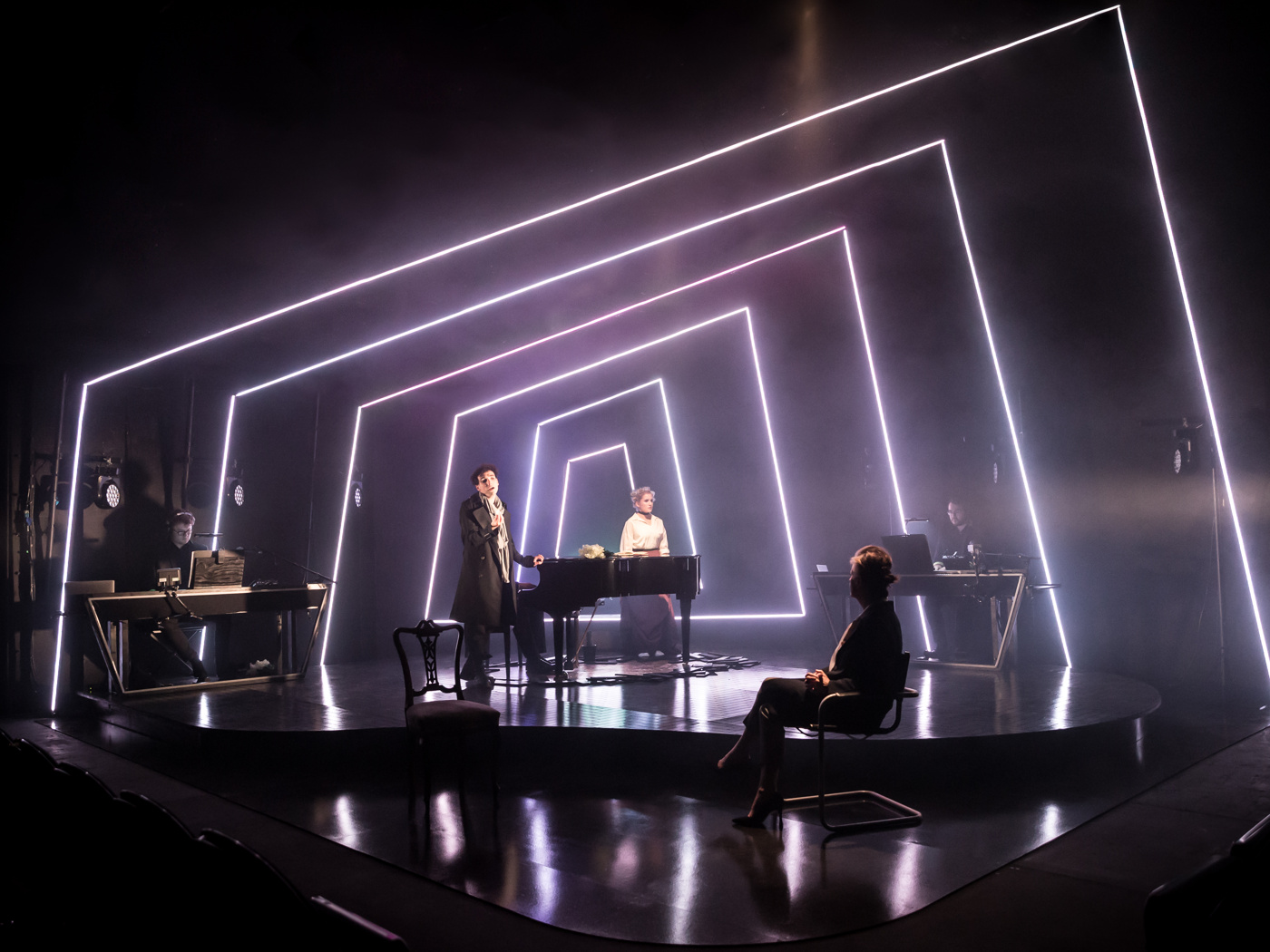Tony-Nominated Composer Dave Malloy on His Russian Inspiration and Hitting London with Preludes and Ghost Quartet

(Photo by Emilio Madrid for Broadway.com)
The Tony-nominated composer/lyricist Dave Malloy of Natasha, Pierre & the Great Comet of 1812 fame hasn’t had a London presence until this fall, when he is unexpectedly being represented twice by two homegrown U.K. productions of extant shows. Preludes, directed with febrile intensity by Alex Sutton, is in the final week of an off-West End run at Southwark Playhouse, with Keith Ramsay as a memorably wild-eyed Rach (a.k.a. the Russian composer Sergei Rachmaninoff). Meanwhile, October 24 sees the start of previews at the newly opened Boulevard Theatre of the director Bill Buckhurst’s U.K. premiere of Malloy’s Ghost Quartet, starring 2019 Olivier nominee Zubin Varla (Fun Home). So, there was plenty to discuss when Broadway.com phoned the engaging, and busy, Malloy for a late-afternoon chat.
How does it feel to be having this London moment?
It’s such a great feeling to have two of my shows up and running in sequence, and two English productions as well—that's to say shows built specifically by London creatives for London audiences. This happened totally by chance, but I couldn’t be more thrilled.
Are you not the sort to get possessive about an original production of one of your shows when you see the same show later done somewhere else?
Not at all. I’m completely open to what a new team wants to bring to something. I’m a great believer that the radically different eye is the best eye, and I like theater that allows that—which is what’s so great about seeing Shakespeare, of course. I really don’t think a creative team needs to be beholden to my vision, which is why I’m happy with a new production out of town just to come on opening night. It's a very different thing, of course, when it’s the first production.
So, you’re not super-protective of your work, the way so many authors (or their estates) can be?
You hear things about the Beckett estate, for instance, being incredibly prescriptive but I’ve always felt quite the opposite. I also think there’s something nice about a production where I’m not breathing down [the creatives’] necks, particularly musically, so that people have a chance to get on with it.
Did you see this Southwark Playhouse production of Preludes as a chance to continue work on a show first seen at Lincoln Center’s Claire Tow Theater in 2015?
Absolutely, especially since the show only had that one New York production whereas The Great Comet has played all over the city [on Broadway and off]. After New York, [Preludes] was done in Austria, and then in Virginia, but that’s not actually very many productions. For the London premiere, there was one scene that I ended up cutting and another that I definitely tweaked. It’s a show with work to be done, as opposed to Ghost Quartet, which feels to me as if it is arriving in London fully formed: I feel like this is the product that I put out into the world.

Can you explain your particular passion for all topics Russian, between Preludes, whose characters range from Rachmaninoff to Chekhov and Tolstoy, and, of course, your Tony-nominated Natasha, Pierre & the Great Comet of 1812, which was adapted from a 70-page section of War and Peace?
My family is part-Latvian, so I grew up with Slavic culture in my blood and the tradition of lots of drinking and singing. And I do think there’s something about the culture that appeals to my sense of melancholy. All the Russian composers, too, are so extraordinary—Stravinsky, Shostakovich, Prokofiev, of course Rachmaninoff—and the freedom with which they pushed at the form.
Is writing about Rachmaninoff and his creative process a not-so-veiled way of writing about yourself: the filmmaker Mike Leigh, for instance, has said that his 1999 Gilbert and Sullivan biopic Topsy-Turvy is really about him?
Yeah, but I kind of think that’s true of any artist in that I’m always seeing myself in my characters. I would say with Great Comet that I have been Pierre, Anatole, and Natasha in different ways at different times. It’s funny that you mention Topsy-Turvy, since that is one of my favorite movies about the creative process ever.
Does Rach’s process of composition in Preludes mirror your own process as a composer? Unlike him, you couldn’t seem less blocked!
Well, I’m very much not that writer in the show in that I feel in a strange way as if I don't do a lot, but I’ve come to peace with that. I feel as if my challenge at this point is to keep to a particular timeline: I've had three big songs and two little songs to finish that have been gestating since July, and I feel as if they are formed in my head.
Looking beyond Preludes, how excited are you to be inaugurating a new London space, the Boulevard Theatre, with Ghost Quartet?
It’s really, really gorgeous. It seems to me like an exceptional space for theater without being so overbearing that it will swallow the show whole. And I love that it has a balcony that rotates around.
Are you getting a sense of the London theatrical ecology?
There’s a lot more government funding for the arts, of course, which is great, and there’s a different language—people saying “beginners” instead of “places” and stuff like that. It’s less a theater thing, but I guess what’s especially interesting for me as an American is that Ghost Quartet is opening the same day as is scheduled for Brexit [October 31], but given the hot mess of American politics, I’m scarcely in a position to comment upon, or even understand, what is going on politically here.
What about movies, which have presumably come beckoning?
I’m curious about film adaptations of my work, as who wouldn’t be, but at the same time theater feels kind of like my place. I like the event of theater and don’t especially see myself as a film composer.
What can you tell us about Moby-Dick, coming in December to ART in Cambridge, Massachusetts?
I think it’s safe to say that the America that Herman Melville is writing about in 1851 is wrestling with a lot of the problems we’re dealing with in 2019. We’re really hoping that the show will speak explicitly to our contemporary time.
In addition to that imminent premiere, what else is on the horizon?
I’m committed to three shows in five years for the Signature Theatre [off Broadway], for which I have done one, Octet. And I’ve got three other things that I can’t really discuss, all of which are super exciting.
Doesn’t one of them involve London’s flagship theater?
I actually can’t talk about that on the record. We’ll just have to wait and see.